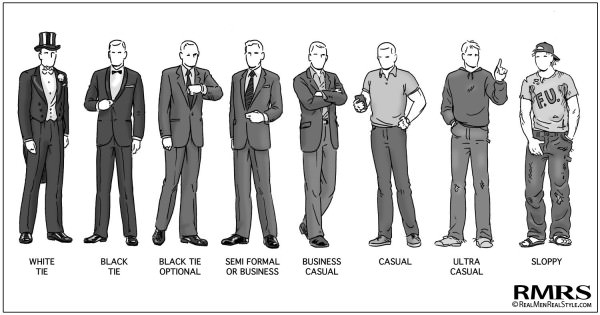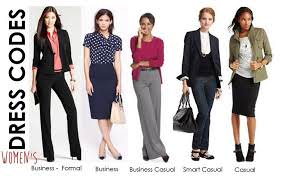
My last company was a technology mail order business. We had a lot of sales and services reps on the phone and over the Internet. As a result, few customers ever came to visit our office. After working at other companies (including IBM) where I had to wear a suit every day, I set a new policy for my company: no dress code. I told team members they could come to work in anything they liked! This lasted until in the summer when many of the staff members started to show up in bathing suits, bikinis and flip flops. My business started to look more like a club’s swimming pool than an office!
Companies for a long time had dress codes. When I started with IBM in the 1980’s, it was strict white shirts, dark suits and ties. Any day I wore a light blue shirt was one where I was open to scorn from my coworkers. In 2010, it was disclosed that UBS had issued 44-pages of guidelines for employee dress that included instructions on “shoulder width and underwear shade”. At first, there was a big movement toward “casual Fridays”. Then more Internet billionaires like Mark Zuckerberg started to wear gray shirts and hoodies to the office. Now, people that work from home might dress in exactly what they slept in!
What should and employer do? When I first started a “no dress code policy”, I wanted everyone to be comfortable at work. I thought it would help the entire team be more productive. When people started to abuse it, the pendulum swung the other way, where I started to believe that if people were more dressed up, they would act more “business like”. This was to distinguish their home and work behaviors. Now, with mobile technology, this policy makes no sense as people have merged personal and professional lives.
It gets complicated says, Susan Scafidi, a law professor at Fordham University and founder of the Fashion Law Institute. She believes there is a “strain of thought that says an employee represents a company, and thus dress is not about personal expression, but company expression. But there’s a counterargument that believes because we identify so much with our careers, we should be able to be ourselves at work.”
This leaves me totally confused. There could be a big power shift brewing. Does it matter what people where to work? Should there be office dress codes? Tell me what you decided!


Here’s our dresscode at MediaSpark: Clothes are mandatory. Style is optional.
On the rare occasions when we do meet with customers, business casual or formal is expected, based on what we expect the client will expect. We want to show respect for the client.
But, now in business it seems everyone is dressing down, so it makes it more widely acceptable I would say. But, showing up in formal wear will make you stand out more today than it ever has … and that could be a good thing for you.
But NO to flipflops and bathing suits – first I heard of that one.
Yes, respect for the client. Got to find out how they dress!
I’ve always told my employees business appropriate in both clothing, shoes, make–up. If it looks like you’re going to the beach, work on your car or in the yard, or going out to a club then in a “normal” business setting that wouldn’t be appropriate and we’d send them home to change.
Great advice!
If it was me, I would think that employees who want to wear whatever they feel like should work somewhere else. How about business casual at least for the executives who deal with the public / clients? It’s certainly understandable that people working from home will wear whatever they want. Making the argument that their dress reflects their personal career aspirations is an excuse and should be turned around on them to ask if that’s really how they want a customer who might someday hire them away to think of them? Wearing blue jeans / work clothes because you spend time moving boxes around in a warehouse is one thing. Office attire is entirely different and the boss shouldn’t be swayed by those who make such ridiculous claims of needing to exercise their self-expression. I think they can self-express on their own time – and not destroy your company’s reputation when they’re on the clock.
So company reputation is still reflected in what an employee wears?
In business a man should have on a sport coat. I always use an example Go to a gas station.Have on a sport coat or a suit, the attendant will say can I help you sir. Go to the same person in a tank top and he will say can help you bud. With the tank top you just do not get the respect.In business respect is everything.
So you agree that people act differently depending on what clothes they wear?
I think you should have a women’s version of the graphic. :) Mary Jane
Got it here – I put it in at the article! Thanks!
You remember what it was like at Whittman-Hart? There was a certain way we “carried ourselves” and we didn’t dress down on casual Friday’s either, to show our professionalism. Now, I dress business casual. I don’t know if I could wear shorts into work or not. I don’t think it make me less productive, I just feel weird doing it. :)
We dressed up because that is what the CEO, Bob Bernard did. Everyday was a fashion show. I always quip that at Whittman Hart the men dressed better than the women because of Bob. I still have my Armani Suits!
I have written extensively about this topic (as a stylist and fashion writer). When you work for someone else or another company you are representing them. That is a fact and and if you care about the company their image should be important to you. (If you want to dress however you want you can always start your own business :) People DO judge others on how they dress – no just for work- but everywhere. It has been studied ad nauseum. I think that letting people express their individually is a great thing but a dress code will give people guidelines. When left to their own devices fashion chaos can ensue. (ie the guy who’s letter you lead with) The guidelines don’t need to be 44 pages- I think you can assemble a kit car and kill fewer trees- but people need something. What kind of shoes are appropriate? What kind of neckline? Hoodies? Jeans?…whatever fits. They also need to know what happens if you don’t follow the guidelines. Rules are everywhere so people aren’t unaccustomed to complying.In my opinion the rules should just be very clear, fit the image of the company, be directed at men and women and comply with any safety issues.
Who should decided the dress code? The owner or the culture at large?
Barry, when we worked together at IBM we dressed like penguins and it was a corporate uniform that had branding implications. For the most part, customers were dressed down… didn’t even realize we were being mocked at the time. Blue shirt, blasphemy. But competitors connected with their audience better than we did from a clothing standpoint. Then the tech revolution came along where skill was more important that Gucci suits. There was a new way of measuring Performance, with a Capital P. Those of us who specialize in achieving Performance realize that clothing doesn’t make the man (or woman). We are more interested in what’s “in the person” than what’s “on the person”..